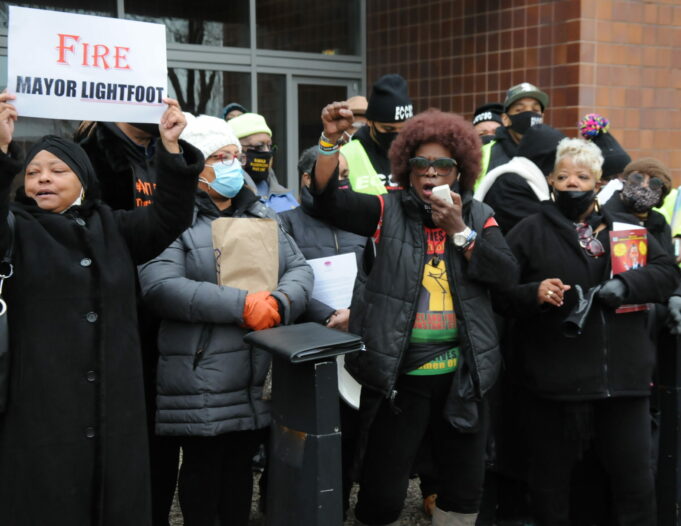By LaRisa Lynch and J.S. Adams
CHICAGO—Anjanette Young recently got her heart-to-heart talk with Chicago Mayor Lori Lightfoot, according to the mayor’s press office. Details of the meeting, which took place Dec. 31, were not disclosed, but a joint press statement released by the mayor’s office called the meeting “very candid and productive.”
“We both acknowledge that today’s conversation, was but a step towards Ms. Young’s healing,” the statement read. “Today’s conversation was not a resolution to the problematic issues that both parties acknowledge exist— which led to the events of February 21, 2019 at Ms. Young’s home. However, there could be no resolution without first engaging in a substantive conversation.”
The statement went on to say: “We are both committed to continuing to identify areas of common ground relating to these issues and to working towards necessary policy changes together.”
Ms. Young is the 50-year-old Black social worker who was handcuffed naked by Chicago police in a wrong raid on her near West Side apartment in February 2019. The incident was caught on police bodycam video, which showed Ms. Young standing handcuffed naked and terrified as police rummaged through her apartment. In the footage, Ms. Young is heard telling police 43 times that they have the wrong house and was not allowed to dress. It took police nearly 40 minutes to finally cover the Black woman with a blanket and then eventually to get dressed.
An earlier meeting between the two was called off when Mayor Lightfoot balked at the meeting’s terms. Ms. Young requested the meeting be held at her church, Progressive Baptist Church, followed by a townhall meeting with the mayor, city aldermen and Police Superintendent David Brown.
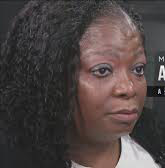
But the Dec. 31 meeting capped off a contentious week as fallout from the wrong raid continued. Several aldermen from the city’s Progressive Caucus questioned Mayor Lightfoot’s commitment to transparency when the first meeting fell through. And newly released emails reveal the mayor was told of the wrong raid on Ms. Young’s home earlier then she claimed, according to local media reports.
Mayor Lightfoot initially claimed she learned of the raid in December as part of WBBM-TV News’ ongoing investigation of wrong raids by police. A top mayoral aide sent an email about the raid characterizing it as “pretty bad” nine months after it occurred in 2019. Mayor Lightfoot later recalled learning of the raid in November 2019. And under mounting community pressure, the police department released additional videos and body-worn camera footage of the raid on Ms. Young’s apartment.
Black women and community close ranks in support
The developments in Ms. Young’s case come on the heels of a protest rally and march called by Rainbow PUSH Coalition’s Women’s Auxiliary. Nearly 100 Black women and a few men marched outside the Chicago Police Department’s Bronzeville headquarters Dec. 27. This comes on the heels of another protest led by Black women activists earlier in the month.
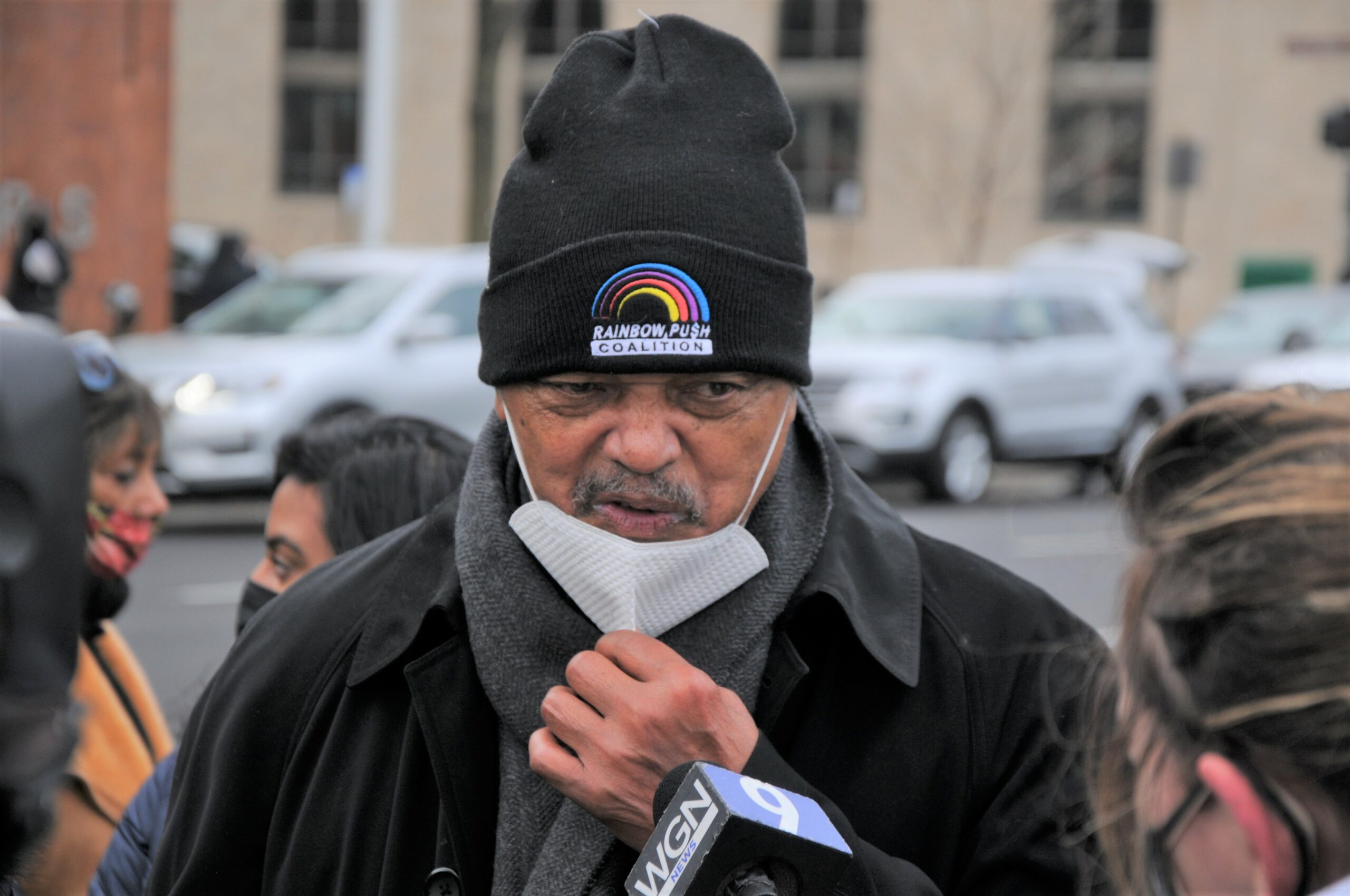
The intergenerational group of women wore pink armbands in solidarity with Ms. Young and chanted “Say her name. Anjanette Young” and “Black women matter.” Others held signs embossed with “I am a woman,” “I am Anjanette Young,” and “You got the wrong house”— the phrase Ms. Young repeated 43 times as police searched her apartment.
The women, part of a coalition of 50 local and national women-led organizations, braved a cold Sunday afternoon to denounce Ms. Young’s treatment by the all-White male officers. But they also came with a list of demands including firing of the officers involved in the raid, immediate reparation for Ms. Young and greater police reforms at both state and local levels. They want the city to fully implement the federal consent decree and to pass the Civilian Police Accountability Council or CPAC, which will give community control over the police. The bill has been stuck in the public safety committee in Chicago City Council since 2019.
More specifically supporters want the city to stop shielding errant police actions. They want a repeal of the state’s law enforcement bill of rights. Illinois is one of the few states that have such a statute, which makes it more difficult to discipline or fire police officers.
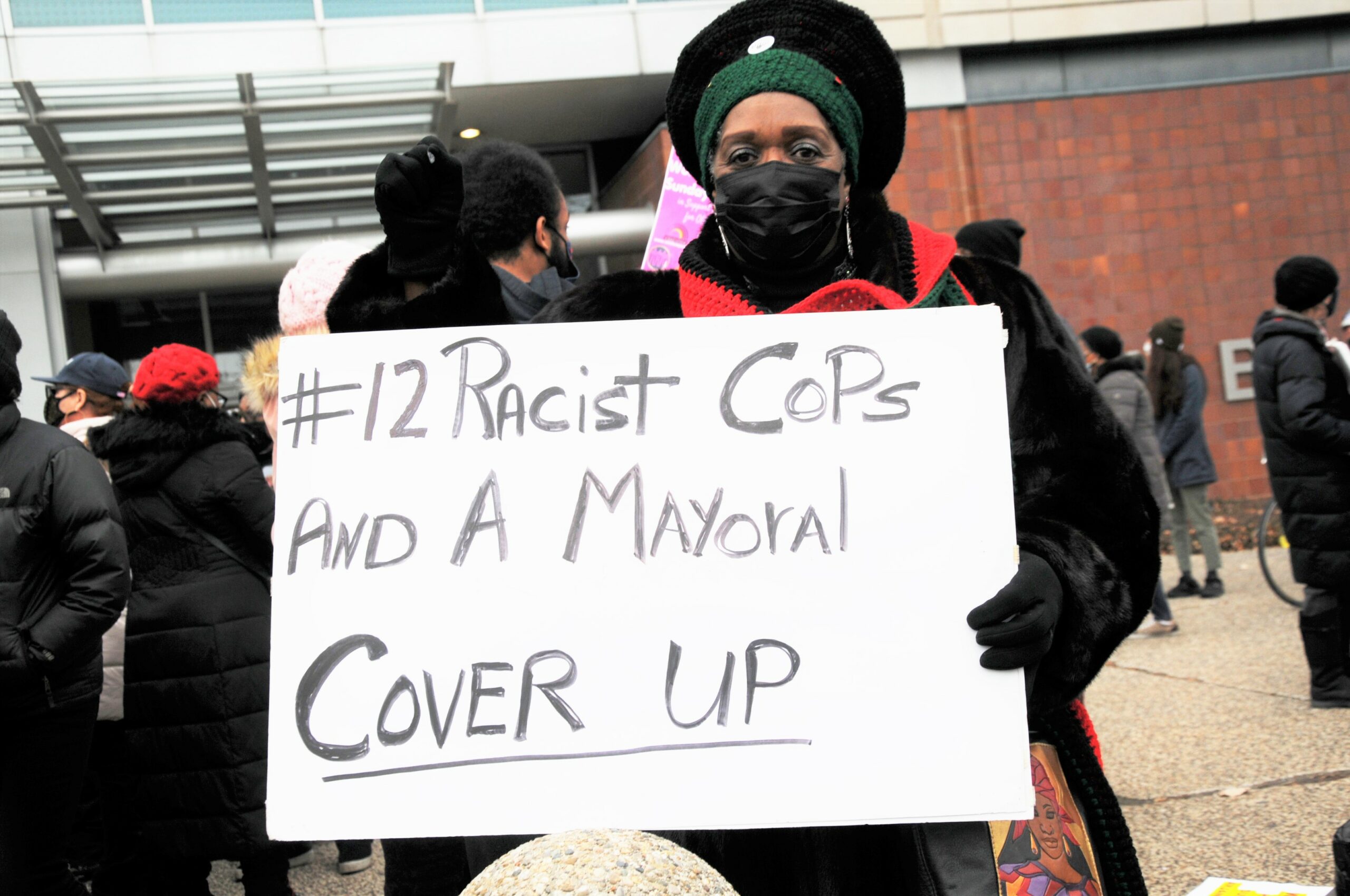
“That is part of the systemic oppression,” said Westside Justice Center’s Tanya D. Woods, Esq., of the state’s peace officers’ disciplinary act. “If you have to go through this lengthy process [including] a jury of their own peers, we will never see justice done. Anywhere there are rules, procedures and laws that are disparately enforced, we see disparate outcomes when it comes to race, and at the bottom of that barrel is often Black women.”
Rev. Janette Wilson, of the Rainbow PUSH Coalition called for transparency and accountability, which were hallmarks of Mayor Lightfoot’s 2019 mayoral run, but were absent in the handling of Young’s case. Rev. Wilson wants the names of the police officers who she said “thought so little of the dignity and humanity of this woman (Young)” revealed. She also wants the name of the judge who signed off on the search warrant.
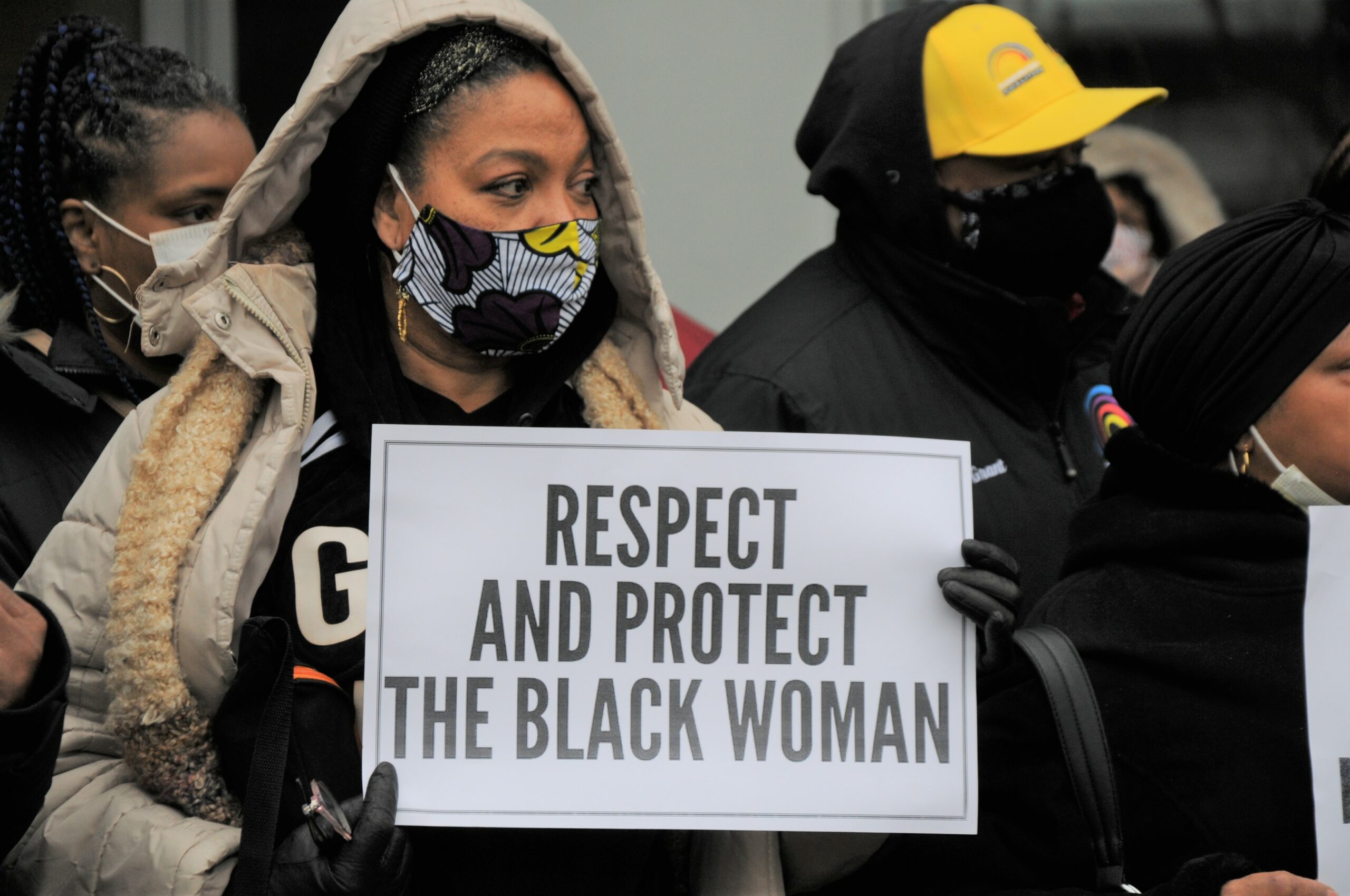
“We want to know the record of that judge so that we can take him out in the next election,” said Rev. Wilson, noting that Ms. Young represents many who’ve been violated by this criminal injustice system. “It is not enough to say good words. We want policies and legislations in [the state’s] veto sessions when you come back in January. We want criminal justice to be on the agenda,” she said.
Illinois’ first Black female Lt. Governor Juliana Stratton lauded Ms. Young’s bravery in the midst of the degradation and humiliation she endured by Chicago police.
“Just as Anjanette Young had the courage to speak out, we too must have the courage to speak out,” she told the crowd. “We … cannot move forward as a society if we do not firmly commit to protecting Black women and girls.”
That protection, Lt. Gov. Stratton said, must extend to pay equity in jobs, fear from physical, sexual and emotional violence in one’s homes and one’s communities. That protection, she added, must be created “through policies and practices” that affirm Black women and girls be treated “as we deserve and in a way that honors our humanity,” said Lt. Gov. Stratton, the mother of four daughters.
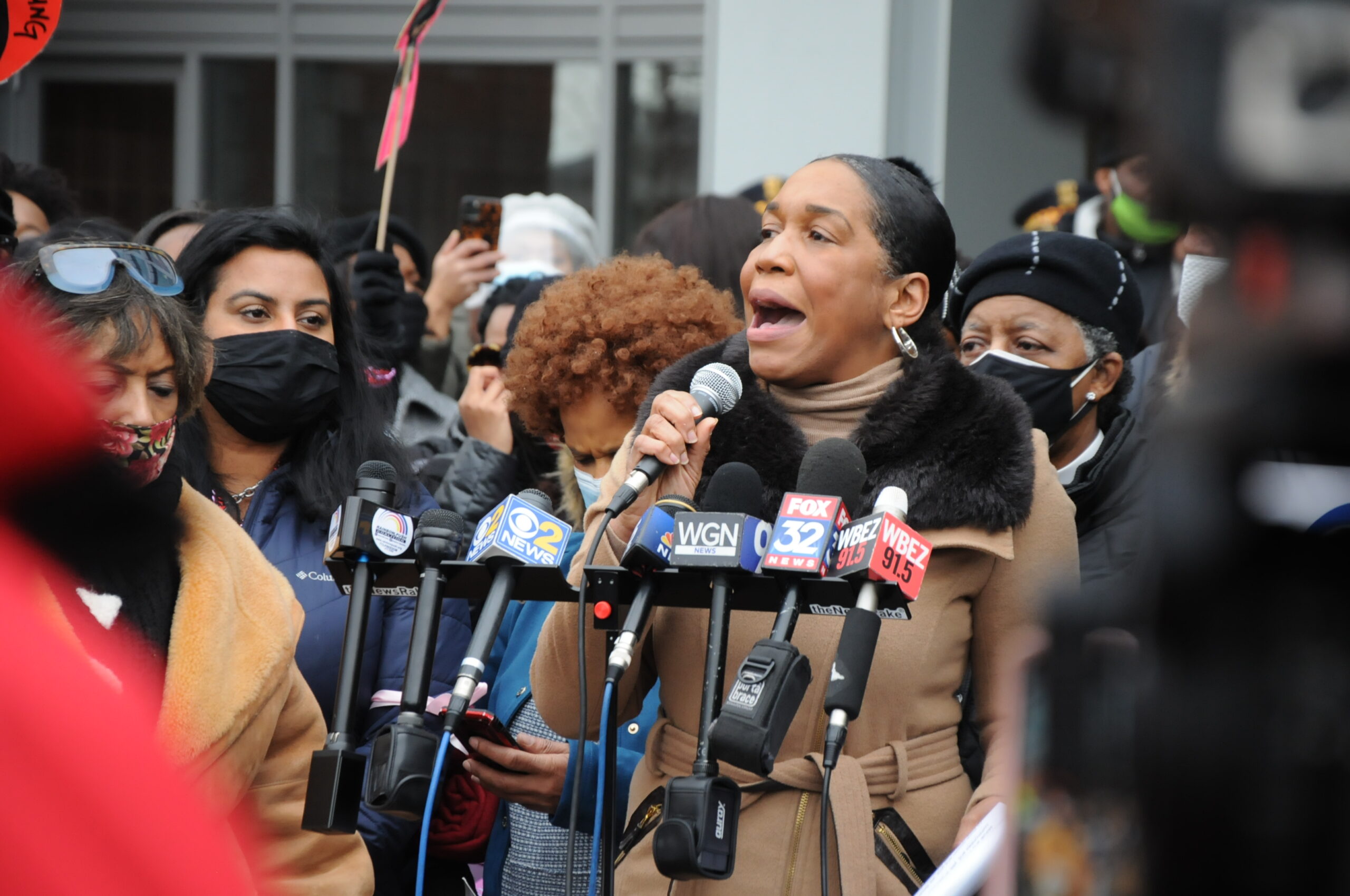
“Protect Black women. Believe Black women. I am Anjanette Young,” she said leading the crowd in a chant.
Attending the rally was personal for Nicole Johnson, founder of the NIA Collective, a newly formed Black women’s group advancing racial and economic justice in Chicago. Johnson attends the same church as Young.
“So, it really could have been me,” she said, noting that the video of the raid reminded her of Black women on a slave auction block having their value speculated over by White men. “But she (Young) was not valued at all.”
Ms. Johnson, who also spoke at the rally, sees similarities in Ms. Young’s wrong raid and that of Breonna Taylor’s, who was killed by Louisville police in her own home. “If this video had not been blocked earlier last year, this could have prevented Breonna Taylor’s botched home raid as well. We need to speak out and protect our Black women.”
And part of protecting Black women is not using the police bodycam footage from Young’s apartment as a training video, something Lightfoot suggested, she noted.
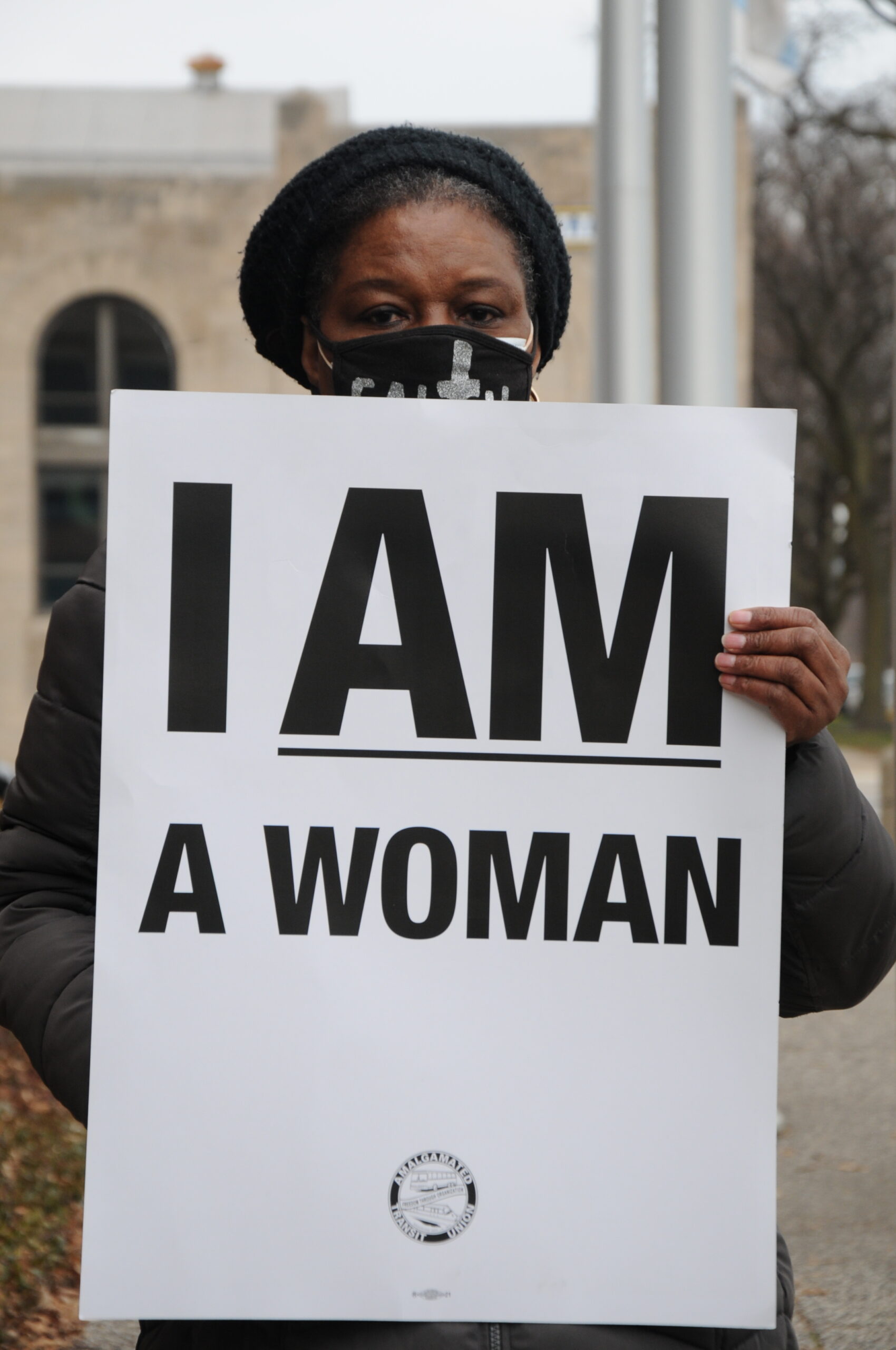
“We don’t need it to be a training video because that could further condition people to respond in a violent way to Black women,” Ms. Johnson said. “You should not use someone’s trauma to train others. There are other ways of doing that.”
What happened to Ms. Young occurs repeatedly in Helen Tuyner’s Englewood community on Chicago’s South Side. That is why Tuyner’s organization Black Community Collaborative is hosting an upcoming Black women’s march. The 1KBlack Women’s March on City Hall takes place at 1 p.m. on January 11. The event kicks off at downtown’s Daley Plaza.
“It is important for me to stand with Anjanette Young because the community I live in, in Englewood, I know a lot of Anjanette Youngs,” Ms. Tuyner said. Though those raids are not televised, she said, it happens to a lot of young parents where police “ran into their homes, searched their homes without a warrant and traumatized them. It is systemic.”
But she hopes these marches, including hers, bring Black women together. “It is not so much as women empowerment, but it is women realizing the power that we have when we are rolling together. We are powerful, but imagine how powerful we are when we are rolling together,” Ms. Tuyner said.
Rev. Jesse L. Jackson Sr., Congressmen Bobby L. Rush (D-Ill) and Danny K. Davis (D-Ill) also attended the rally. Rev. Jackson, head of the Rainbow PUSH Coalition, blasted the police department, which he said has a system that protects police. Black people, he said, continue to be shot down by police nationwide with almost impunity. Two fatal police shootings in Ohio occurred when a Black man was shot while entering his home and another shot while holding a cellphone. But Rev. Jackson noted that if 11 Black cops wrongly entered a White woman’s house and handcuffed her naked, the scene in Chicago would be quite different.
“We cannot adjust to being violated in this way. We must end the carnage and genocide of Black people,” Rev. Jackson said. He urged law officials from the U.S. attorney general to local state’s attorney to do their jobs and “stop the carnage and violation of Black people.”
“People must protect and serve and not kill and go to desk duty. If you shoot somebody in the back, that’s murder and you should be charged with murder quickly,” he said.
Jojackson Igietseme was among the handful of men attending the event. He said he was not surprised by the few men in attendance. Many actions against social and racial injustice are led by Black women even though men are often the victim of these injustices, he said.
“I think it is very important that as Black men we show up for Black women,” said Mr. Igietseme, who’s visiting from Nashville, Tenn., for the holidays to see his girlfriend. Both attended the Dec. 27 rally. “There has been a lot of murders at the hands of police of Black men and Black women are always at the forefront of those movements.”
Showing up for Black women is the least men can do and it shouldn’t have to take proximity to a Black woman to support their cause, he added.
“It shouldn’t have to happen to your mother or your friend, or your sister or your aunt for you to step up,” Mr. Igietseme said. “There is more work to be done in terms of educating other Black men about how to show up for Black women in a number of different ways. It is not just a hashtag on Twitter that you throw up pictures. It’s actually doing the work and being there.”
A disturbing pattern of abuse, but not surprising
When he first heard about what happened to Ms. Young, Houston community organizer Kaleb Taylor said he was in disbelief. But after hearing the specifics of the case, he was not surprised.
“It just is a reincarnation of the situation that got Breonna Taylor killed and we’ve seen this occur in city [after] city and police department [after] police department of reckless behavior,” he said.
For Mr. Taylor, this also hits closer to home. He says one of his coworkers dealt with police bursting into her home, which was the wrong location, under a no-knock warrant.
“Had it been a situation like Breonna Taylor’s where someone in the home was rightfully armed and seeking to defend themselves against what could’ve been a home invader or what have you, it could’ve ended with the loss of this woman’s life,” he said. Because of these experiences, Mr. Taylor believes these kinds of situations happen more often than the public may be aware of.
“With any case of police misconduct, the cases that make it to the media like this one are far and few in between. These are just flashpoints of what’s happening on a daily basis,” he said.
Ruben Roberts, former president of the Miami-Dade County chapter of the NAACP in Miami, Fla., says one of the most disturbing parts of this case was the lack of respect for Ms. Young.
“Here it is, they come into a person’s house. Clearly, they were in the wrong home. No-knock warrant and the lady is naked. They don’t even have the decency to put something on top of her,” Mr. Roberts said. “I felt that it was a total disregard for a person’s privacy, respect.” He described the move as a power play.
“One of them at least should’ve said listen, let’s put something on top of her. I just felt that they were totally disrespectful and it’s a trend when it comes down to African Americans,” he said.
Danielle Nolen, a young activist in Chicago, said she was devastated while watching the video.
“I had so many different thoughts going on in my mind because there’s so many instances where Black women are killed at the hands of police officers,” she said. “That’s why it was so hard for me to watch because I didn’t know what was going to happen in that video. It’s a really unfortunate situation for all Black women in America.”
As a young Black woman Ms. Nolen said hearing about cases like these is scary.
“I know people say this all the time, but the police are supposed to protect and serve but they don’t do that, especially with the Black community,” she said. “We don’t trust the police at all and it’s because of years and a history of abuse by them.”
As she watched the video, Ms. Nolen says it reminded her of instances where Black women aren’t listened to.
“[Ms. Young] said so many times, you got the wrong person and they just really didn’t listen to her,” Ms. Nolen said. “It makes me think about the medical field and when Black women call the police and they just don’t show up. It just really puts us in more danger.”
Ms. Nolen says she was disappointed at how Ms. Lightfoot handled the situation.
“As a Black woman, I felt like it was her job to really protect us, especially Black women in Chicago,” Ms. Nolen said. “It really hurt to see that she knew about that video and she just didn’t say anything to us about it or just didn’t bring it up at all.”
Mr. Taylor said Ms. Lightfoot’s response made the case more frustrating for him. “We have a Black mayor in Chicago and although there has been conflicting statements about when she knew about it, the fact is she knew about it in 2019 and there still hasn’t been, in my opinion, enough of a concerted effort to ensure this doesn’t happen again,” he said. “And the fact that this administration fought to keep this video from becoming public, it just shows that having Black faces in institutions that are still rooted in systemic racism does not mean liberation for Black people.”
Mr. Roberts says the disregard for Black life is present, regardless of who’s in leadership.
“Whether it’s a Black chief or a White chief or whatever, they have a disregard for African Americans in this country when it comes down to policing,” he said. “They are not protecting and serving people in the Black community; they’re policing people in the Black community and I have a serious problem with that.”
Barbara Arnwine, a lawyer and founder of the Washington, D.C.-based organization Transformative Justice Coalition, says there’s no excuse for what happened to Ms. Young.
“This happens too often to Black women and it’s a pattern and practice of police departments and is absolutely inexcusable,” she said.
Ms. Arnwine says she also went through a wrongful police raid about a decade ago. She says the experience was traumatic for her family, including for her 80-year-old mother at the time, who was not fully covered.
“One of the complaints in [Ms. Young’s] case is that there weren’t women,” Ms. Arnwine said. “When they raided my home, knowing there were women in the house, they brought no women officers. Not one to be on the scene.”
Ms. Arnwine says according to reports, officers know a high percentage of people will be naked during raids, largely because they are typically conducted in the very early hours of the morning.
“It is, as [Ms. Young] said, sexual assault,” Ms. Arnwine said. “I agree with her. And it’s purposeful, deliberate, planned sexual assault, because they know of the condition of what Black women or the other women will be in that household.”
The fact that the city of Chicago sat on the situation for months disturbed Ms. Arnwine.
“It just shows that even with a Black woman mayor that you could have this kind of abuse, because police are not subjected to just the leadership of the city,” she said. “They don’t take on that characteristic. They continue to be imbued with their origins, of seeing themselves as being there for racial control.”
With cases such as Ms. Young’s coming to light in the wake of the death of Breonna Taylor, Ms. Arnwine said this sends a message to the world that Black women are vulnerable targets.
“But the good news is that Black women, we have a whole different reality about who we are,” she said. “That regardless of this mistreatment, we’re gonna speak out like Ms. Young is doing. She’s not just speaking out for herself; she’s speaking out for every Black woman in the United States.”
“Often Black bodies and Black women aren’t seen as representative of all women,” she said. “We’re seen as some kind of unique category of women that doesn’t apply to White women, Latino women, other women. But the fact that all women of all races took to the streets is a powerful reminder that we’re beginning to penetrate the consciousness of some women, that we all are capable of being assaulted by police in a brutal and evil, sexist way.”












